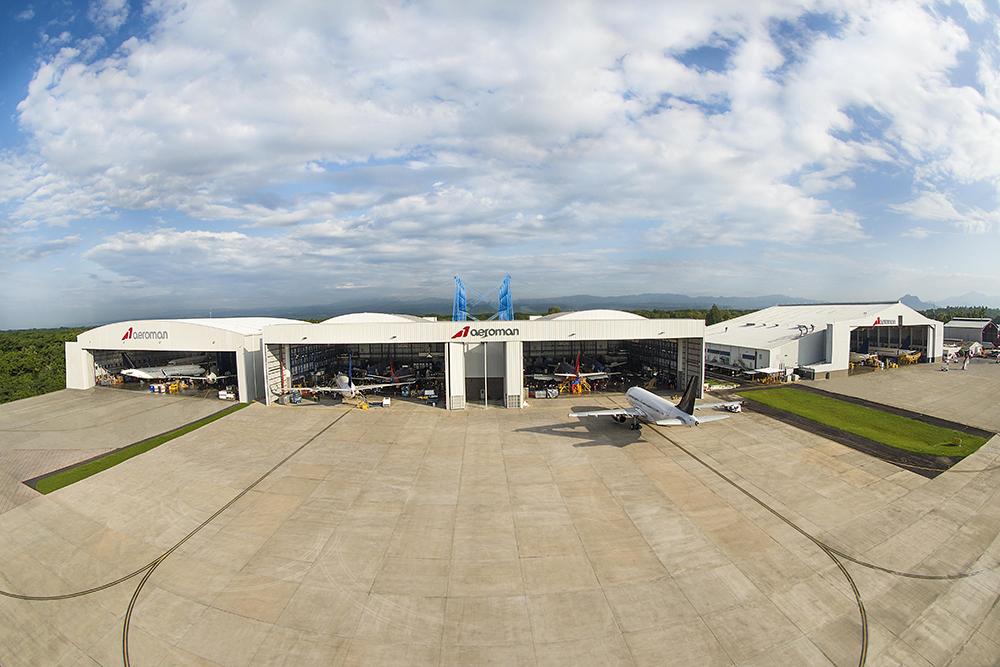Aeroman Plans 20-30% Growth As El Salvador Commits to Recovering Aviation Sector

U.S. domestic flights are now running at about 25,000 per day—essentially the same as before the pandemic—and U.S.-to-Latin American operations stand at more than 2,000 per day, actually above pre-COVID-19 levels. That is good news for the Central American shops that were doing an increasing share of U.S. and other countries’ maintenance in the two decades before the virus hit.
Not coincidentally, officials in El Salvador have just launched AERO Cluster El Salvador, and the nation’s major commercial MRO, Aeroman, has big plans to expand its capabilities.
During the launch of AERO Cluster at the end of October, Aeroman CEO Alejandro Echeverría announced the coming inauguration of his 43rd aircraft maintenance production line and further expansion plans. “In the next five years we plan to grow 20-30% in maintenance capacity and reach up to 75 production lines installed in El Salvador,” Echeverria said.
At least, that is the goal. However, Echeverría noted his ambitious plans can only be fulfilled if Aeroman has access to sufficient mechanics and can operate under a stable regulatory regime. Salvadoran workers have been the key to Aeroman’s success and Echeverria expects to add 4,000 new position in the next five years.
The government of El Salvador certainly wants to see the growth happen. The country’s Ministry of Trade and Investment says it is now responding to the needs of the MRO sector with the creation of the AERO Cluster, which has been planned for a long time under several governments.
At the official launch of Aero Cluster, Minister of Economy María Luisa Hayem assured attendees that the government will support the aviation sector as it continues its “remarkable” recovery. Hayem recalled that before the pandemic in 2019, MRO earned revenue of $320 million, generating in El Salvador alone 10,000 jobs that paid an average of over $700 per month. That is more than double average earnings in a nation where per-capita GDP in 2019 was just $4,200.
Hayem understands the environment necessary to make it all happen. “We are very clear that companies and investors need conditions such as agile, simple, automated procedures; a modern regulatory framework that provides certainty and promotes investment; a solid infrastructure and talent that responds to the needs of the sector,” he said.
As envisioned, AERO Cluster El Salvador will integrate the entire value chain of the aeronautical and aerospace industry through manufacturing and supply of services. It will work through a concept called “Triple Helix,” under which government, private enterprise and academia join efforts to strengthen the aviation sector.
Hayem emphasized some of El Salvador’s competitive advantages in pursuing more of the Americas maintenance work: “Geographical position, air and land connectivity, trade facilitation, dollarized monetary stability—plus bitcoin now—and human talent, as 55% of the workforce is under 40 years old.”
El Salvador’s Secretary of Trade and Investment Miguel Kattán explained that, under the Triple Helix concept, academia must prepare the trained personnel, business must raise money and attract customers, and the El Salvadoran government must ensure the conditions for it all to work. Kattán expects the AERO Cluster project to create a total of 2,500 new jobs per year, depending on how well it all comes together. The government will measure the job gains each year. He stressed that AERO Cluster “not only has to do with airlines or maintenance, but also with those who make harnesses for aircraft, assembly, manufacture of parts, systems, software—this is a start.”
Six institutions in El Salvador are already training human talent in aeronautics, and two more institutions are in the process of certification to do this training. Mario Olmos, director of Don Bosco University, said this initiative could be the “trigger for a greater and permanent collaboration between the industry’s stakeholders and boost the take-off of other sectors.”
Olmos explained that “the academy not only trains professionals, but also provides research, development and innovation capacity that makes technology transfer to local companies and entrepreneurs possible.”
Don Bosco University launched aeronautical maintenance technician training in 2005, from which 900 students have already graduated. Since 2010, the school has offered aeronautical engineering training.





